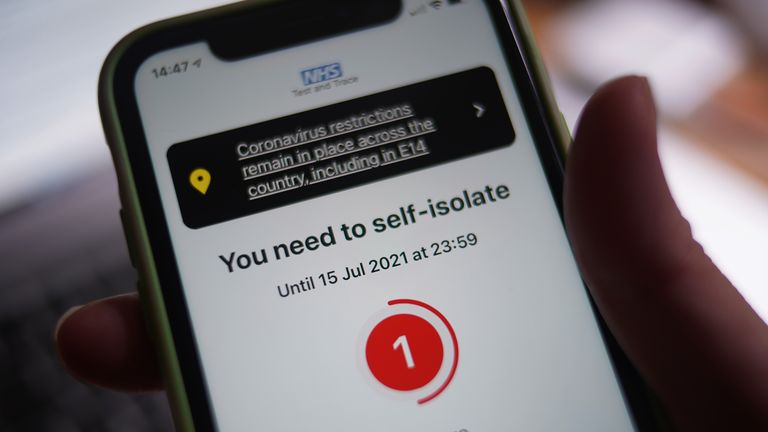A record 618,903 people in England and Wales were pinged by the NHS COVID-19 app in a week, latest figures show.
The alerts were sent to users of the app in the week to 14 July, telling them they had been in close contact with someone who had tested positive for coronavirus and to self-isolate.
Of those, 607,486 alerts were sent to people in England – up 16.8% on the 520,194 recorded for England in the previous week.
COVID news live – latest UK updates
A further approximately 428,000 people were contacted by NHS Test and Trace contact tracers in England and told toself-isolate in the week to 14 July, the latest figures show – about 90% of the 475,465 people identified as close contacts of COVID cases.
AdvertisementThis came after 259,265 people tested positive for COVID-19 in England at least once in the same period, up 33% on the previous week.
More on Covid-19 Ghetts addresses confusion over gig restrictions at Mercury Prize nominations launch COVID-19: Labour MP asked to leave the Commons after saying Boris Johnson has ‘lied over and over again’ during pandemic COVID-19: The value of the NHS app is low and getting lower as more people are fully vaccinated COVID-19: UK records 39,906 new coronavirus cases and 84 more deaths Tokyo Olympics: Guinea pulls out of Games over ‘resurgence of COVID variants’ COVID-19: Minister suggests other ‘crowded’ venues where vaccine passports could be introducedIt is the first set of figures since the majority of restrictions were lifted in England on Monday.
Many experts have been predicting that the relaxing of regulations could lead to a surge in cases as the virus spreads rapidly through the unvaccinated population, which currently stands at 12% of adults and almost all children in England.
Govt ‘reserves right’ to mandate jab passport useOn Tuesday, it was revealed that more than one million children in England were off school last week due to coronavirus-related reasons.
While nearly seven in 10 adults have the protection of two jabs, currently all of those are required to isolate if told to by NHS Test and Trace.
And on Tuesday, Downing Street said it was “crucial” that people isolate when they are pinged by the NHS COVID app.
Speaking to Kay Burley on Thursday, Business Secretary Kwasi Kwarteng said the government was “very concerned” about the numbers of people being pinged by the NHS app.
Mr Kwarteng said ministers were “monitoring” the situation and would be setting out a list of exempt critical workers “very soon”, with the expectation that it will be published on Thursday.
The consequences of what has been dubbed the recent “pingdemic” has been reports of empty shelves in some supermarkets, businesses left without staff and delays in supplies reaching consumers.
‘COVID is a test and the world is failing’They include:
• Supermarket and retailers saying they are under pressure to keep supermarket shelves stocked as lorry drivers and production workers isolate
• A food distribution company is advising its staff to come into work after getting pinged if they have a negative PCR test
• Police response times are “under strain” as forces are hit by impact of staff shortages
• Several senior politicians including the prime minister, health secretary and opposition leader are among those self-isolating
Ian Wright, chief executive of the Food and Drink Federation, told Sky News’ Ian King Live: “The situation is concerning and it’s up and down the supply chain.
“It’s not consistent across the country. There are some places where shops and factories are working perfectly normally and in other parts… in manufacturing, there are some places where a lot of factories under extreme pressure… because they may have up to 25% of the staff off.
Data dive: COVID ‘ping’ aligns with cases“Increasingly the cause is pinging and it’s getting worse. In manufacturing, it’s certainly a problem. It’s particularly a problem in abattoirs.
“There’s been a lot written about the issues of distribution drivers and HGV. And we know from this morning’s coverage that there were really severe problems in hospitality as well… Where it’s happening, it’s bad.”
The British Retail Consortium (BRC) urged the government to act.
BRC chief executive Helen Dickinson told BBC Breakfast: “The most important thing for government to do is to recognise that the current situation is untenable.”
